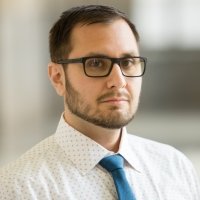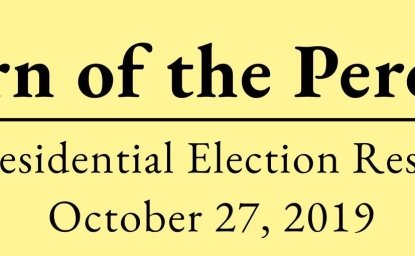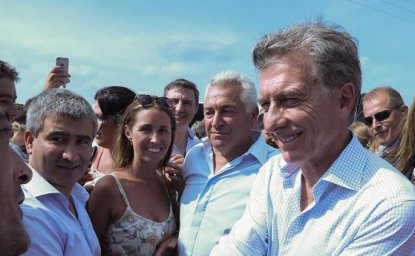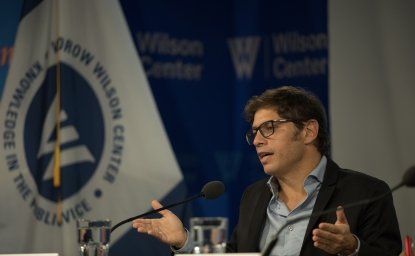
A blog of the Argentina Project
In the run-up to the October presidential election, Argentina’s economy is on the precipice. Its country risk is the second highest in the world, after Venezuela, and annual inflation is the worst since 1991.
Argentina is no stranger to economic challenges, but at least some of the country’s economic strife these days is caused by the gnawing uncertainty ahead of the election – one of the most competitive in recent history.
Polls show President Mauricio Macri neck-and-neck with his predecessor, Cristina Fernández de Kirchner, who is running for vice president on a ticket with her former chief of staff, Alberto Fernández.
Both candidates forecast doom if their opponent wins. Ms. Fernández de Kirchner paints Mr. Macri as a coldhearted businessman whose austerity policies impoverished Argentina, even as he indebted the country over the past three years.
For his part, Mr. Macri portrays the Fernández-Fernández team as spendthrift and corrupt, and warns it would reverse recent painful efforts to balance the budget. On social media, the Cambiemos campaign slogan is “Defensores del Cambio.”
Mr. Macri’s branding of his rivals pleases his base and helps attract disillusioned moderates who fear a return to the 12 years of populism that Mr. Macri ended with his surprise election in late 2015. (His choice of moderate Peronist Miguel Ángel Pichetto as his running mate was designed to appeal to those same voters.)
However, though Mr. Macri’s description of his opponents is hardly flattering, it could actually come in handy for the former president and her running mate. Should they decide to play spoilers to Mr. Macri’s fragile economic program, his financial fearmongering could backfire.
A single ill-timed statement by the Fernández-Fernández team could instigate a run on the currency and increase country risk ahead of the election, locking local companies out of global capital markets. That would worsen inflation, lowering real wages and provoking unions and social movements to ramp up their conflict with the government.
Should they avoid blame for sparking a new crisis, the chaos could increase the kirchneristas’ chances of victory. Axel Kicillof, the kirchnerista candidate for Buenos Aires governor, has preemptively mocked Mr. Macri for trying to blame his potential successors for any economic turbulence. “Se pasó un año y medio echándole la culpa al gobierno anterior,” he said at a Wilson Center event last month, “y ahora se la echa al gobierno que está por venir.”
This all might sound unfair to the former president. After all, when Ms. Fernández de Kirchner announced she would settle for the vice presidency, she stressed the need for national unity and future economic stability.
But Peronists playing spoiler is hardly a new strategy.
No non-Peronist government has finished its term since 1928; all were either deposed in a military coup (1930, 1962 and 1966) or collapsed amid social unrest worsened by Peronist-dominated unions (1989 and 2001).
The first non-Peronist president since the “Dirty War,” the Radical Raúl Alfonsín, resigned amid hyperinflation that had led to a large increase in poverty and civil unrest. Throughout his term, as the economy teetered, Peronist-led unions organized 13 general strikes, further destabilizing his administration.
Radical President Fernando de la Rúa, elected in 1999, grappled with Argentina’s worst recession in modern history and rising popular rage, including widespread looting and violence. Like Mr. Alfonsín, Mr. de la Rúa’s hold on power further weakened due to strenuous opposition from Peronist-led unions. In all, he endured ten general strikes, including two in December 2001, immediately prior to his resignation.
Looking back, Mr. de la Rúa, who fled the Casa Rosada in a helicopter, describes his ouster as a “coup carried out by Peronists.”
Mr. Macri has feared a similar fate since the beginning of his term. In January 2018, when Argentina’s economy was still relatively strong, a powerful union boss, Luis Barrionuevo, warned Mr. Macri, “the unions were attacked by the military, by Alfonsín and by de la Rúa, and it ended badly.” The next month, another Peronist union leader, Hugo Moyano, predicted Mr. Macri’s early exit from the presidency. “They have little time left,” he said.
Although the role of Peronists in chasing their opponents out of office is debatable, it is clear non-Peronists rarely feel secure in power.
For now, the Fernández-Fernández campaign does not appear to be intentionally spooking markets to create a political crisis. Rather, it has signaled its commitment to repay debt and to maintain relations with the International Monetary Fund, which approved a $56 billion loan to Argentina last year. In an interview with Bloomberg late last month, Mr. Fernández said, “What we can guarantee is that we aren’t going to fall into a new default.” He added, “I received an Argentina in default. I don’t want Argentina to fall back into that.”
Helpfully, Ms. Fernández de Kirchner and Mr. Fernández have been vague about their economic policies, recognizing that markets would react negatively to any hints of a populist sequel.
Indeed, Ms. Fernández de Kirchner’s choice of Mr. Fernández was seen as an attempt to calm market jitters about her return for a third term in national office. Though he briefly served as his running mate’s chief of staff, he is more associated with Néstor Kirchner, whose administration was relatively stable and economically successful. Under Mr. Kirchner, Mr. Fernández maintained ties to moderate Peronists, unions, the media conglomerate Clarín, private sector leaders and key economic sectors. Those relationships withered under Ms. Fernández de Kirchner, but could presumably be rebuilt by Mr. Fernández.
Moreover, provoking a crisis would be a risky political maneuver. And if it worked, it would saddle a Fernández-Fernández administration with an even heavier burden.
That said, should polls sour on Ms. Fernández de Kirchner and Mr. Fernández, she might recalculate her strategy. As a student of Peronism, the former president is well aware of her party’s historic ability to take advantage of the country’s economic vulnerabilities.
Author


Argentina Project
The Argentina Project is the premier institution for policy-relevant research on politics and economics in Argentina. Read more

Explore More in Argentina Elige
Browse Argentina Elige
Argentina Project Podcast: Guess Who's Back

Return of the Peronists: 2019 Presidential Results

Argentina’s Black Swan Primaries

